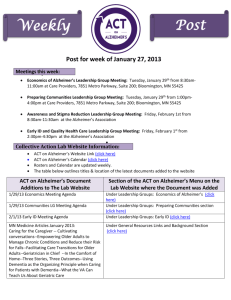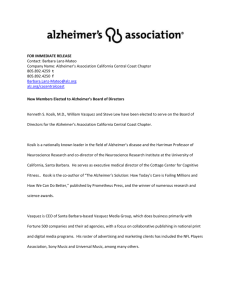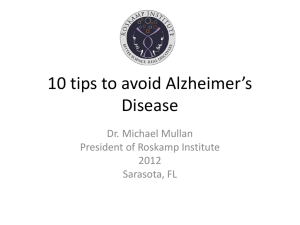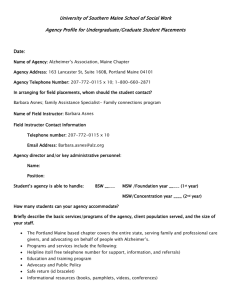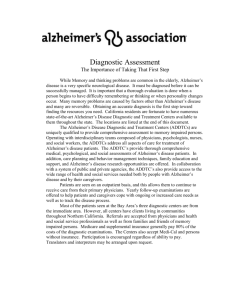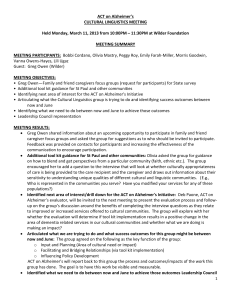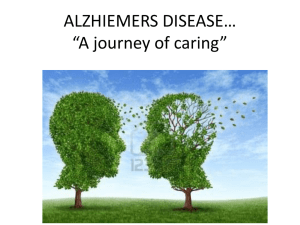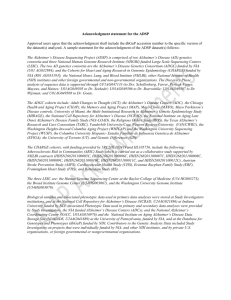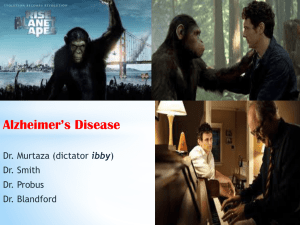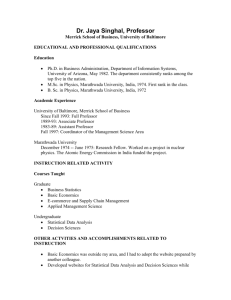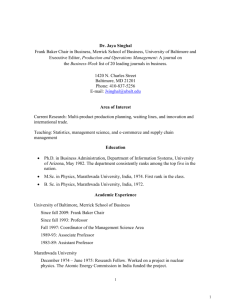Expository Essay
advertisement
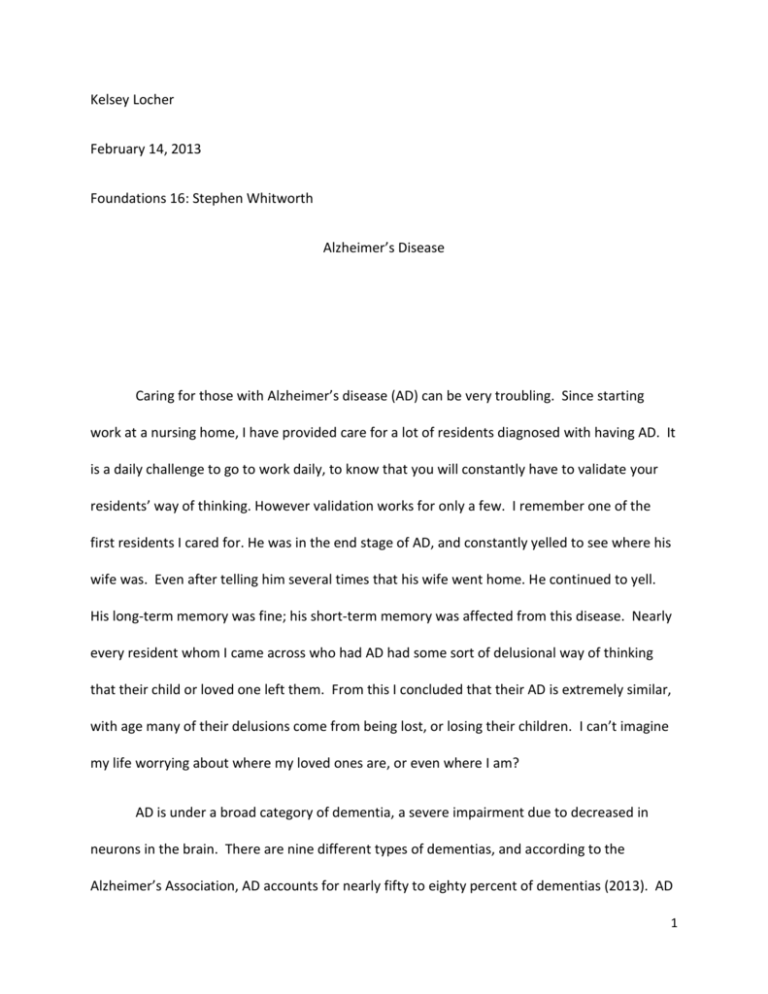
Kelsey Locher February 14, 2013 Foundations 16: Stephen Whitworth Alzheimer’s Disease Caring for those with Alzheimer’s disease (AD) can be very troubling. Since starting work at a nursing home, I have provided care for a lot of residents diagnosed with having AD. It is a daily challenge to go to work daily, to know that you will constantly have to validate your residents’ way of thinking. However validation works for only a few. I remember one of the first residents I cared for. He was in the end stage of AD, and constantly yelled to see where his wife was. Even after telling him several times that his wife went home. He continued to yell. His long-term memory was fine; his short-term memory was affected from this disease. Nearly every resident whom I came across who had AD had some sort of delusional way of thinking that their child or loved one left them. From this I concluded that their AD is extremely similar, with age many of their delusions come from being lost, or losing their children. I can’t imagine my life worrying about where my loved ones are, or even where I am? AD is under a broad category of dementia, a severe impairment due to decreased in neurons in the brain. There are nine different types of dementias, and according to the Alzheimer’s Association, AD accounts for nearly fifty to eighty percent of dementias (2013). AD 1 is a relatively new and mysterious disease. AD was discovered in 1906, being described as a chronic disease that disables brain cells from sending information to one another (Singhal et al, 2012). There are other many interesting facts on AD, within the fields of its signs and symptoms, treatments, and preventions. AD is the most common form of dementia, Robert Howard et al. described dementia as a disease that can cause trouble with intellectual abilities, and have the potential of interfering with daily activities in life (2012). Memory impairment is the widely known sign of AD. During the beginning of AD, remembering new information is extremely difficult, and those rarely need help performing activities of daily living, such as bathing, toileting, dressing, etc. As this horrible disease continues more brain cells are destroyed, leading to other intellectual impairments such as wandering, behavior changes, increased confusion, and extreme difficulty with speaking, swallowing, and walking (Alzheimer’s Association 2013). Lisa Turner expresses ten signs of AD including, but not limited to: finding that completing familiar tasks is difficult, forgetting where you’re at, repeating the same conversation over and over, or even having difficulty with visual problems (2013). These signs are all due to decreased brain cells. S.J. Reeves et al. describes post-mortem findings with, “…increased senile plaque density in the hippocampus [responsible for processing emotions and memories] and … in the middle frontal cortex [responsible for motor activities.]” (2012). This supports what the Alzheimer’s Association says about one of the causes of AD, which is that the plaques found in the brain interfere with nerve cells, and leading the nerve cells to die off. Many people tend to produce a very limited amount of plaque, whereas AD produces plaque at a much higher rate. 2 Not so surprisingly, scientists studying AD have found a predictable pattern from which plaque starts growing in areas associated with memory and then gradually spreading to other areas of the brain. (Alzheimer’s Association 2013). Scientists continue to do research in order to find a cure for AD, but for now there is no definite cure for this disease. According to the Alzheimer’s Association, there are about 5.4 million Americans that are diagnosed with AD, and this spectacular number is estimated to grow to nearly 16 million by 2050 (2013). With this growing of numbers, there is pressure to find a cure, but for now what are available to are treatments to hinder the disease. There are homeopathic treatments that are available, such as herbal treatments. Non-drugs treatments include the use of herbs to help hinder the spread of AD. In treatments for AD, it is helpful if the homeopathic treatments being are used have a higher dose of anti-inflammatory and antioxidants within themselves, which is why herbs are a great choice (Singhal et al. 2012). According to Singhal et al, “Ginkgo Biloba is the best known herb for Alzheimer’s disease…” (2012). This herb is known to reduce blood pressure, and aid in boosting cognition during the early stages of AD (Singhal et al. 2012). Another herbal drug is Melissa officinalis also known as “lemon balm.” The studies done on lemon balm have shown that it improves the cognitive state of mind for a short amount of time, along with its ability to improve mood (Singhal et al., 2012). Herbal treatments raise concern, however, since the Food and Drug Adminstration (FDA) is not required to approve dietary supplements (Alzheimer’s Association 2013). 3 There are also some ways that some believe help prevent AD symptoms appearing. In an article written by Lisa Turner, she quotes Daniel Amen, MD, author of Change Your Body, saying, “Childhood isn’t too soon to start protecting your brain, and changing habits in adulthood can delay the onset of Alzheimer’s, and may prevent it entirely” (2012). Many studies have shown that physical exercise can be on the most important ways to prevent AD. Exercising thirty minutes several times a week, appears to inhibit Alzheimer’s-like brain changes (Turner 2012). During the 1960s, it was believed that aluminum was a cause of AD. However, after many studies on aluminum, there has been no confirmation that it can cause AD (Alzheimer’s Association). Another way to help prevent AD is using your brain more often; playing chess, checkers, or even word games that can be found in newspapers can help simulate your brain in order to prevent the occurrence of AD (Turner, 2012). Knowing these facts and more will keep you prepared to know what to expect if you or a loved one is experiencing any of the signs and symptoms. According to the Alzheimer’s Association, AD is the sixth leading cause of deaths in the United States of America, and the only cause of death in the top ten without having a definite way to prevent or cure. On average one in eight Americans over the age of 65 has AD (Alzheimer’s Association). You can however lessen the chance of your likelihood of becoming one of those eight if you take steps now to help improve to prevent or hinder the onset of AD. Will you take steps needed to improve the health of yourself? 4 Works Cited: Alzheimer’s Association. Alzheimer’s Association. AZL, 2013. Web. February 10, 2013. Howard, Robert J., et al. "Origins Of Delusions In Alzheimer's Disease." Neuroscience & Biobehavioral Reviews 36.10 (2012): 2274-2287. Academic Search Complete. Web. 13 Feb. 2013. Singhal, Anil Kumar, Vijay Naithani, and Om Prakash Bangar. "Medicinal Plants With A Potential To Treat Alzheimer And Associated Symptoms." International Journal Of Nutrition, Pharmacology, Neurological Diseases 2.2 (2012): 84-91. Academic Search Complete. Web. 13 Feb. 2013. Turner, Lisa. "FEED YOUR HEAD: 12 Steps To Sharpen Your Mind." Better Nutrition 74.1 (2012): 46-50. Academic Search Complete. Web. 14 Feb. 2013. 5
